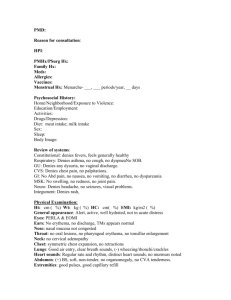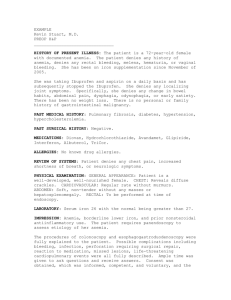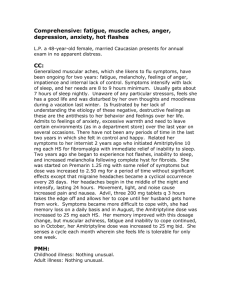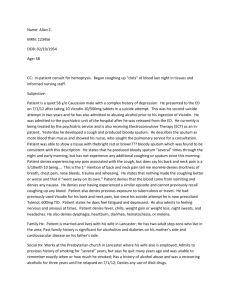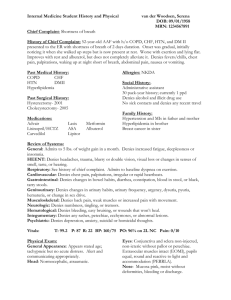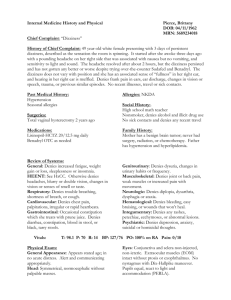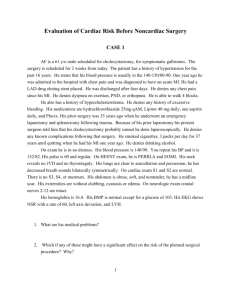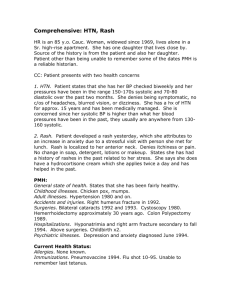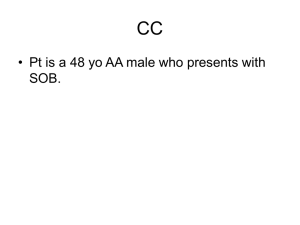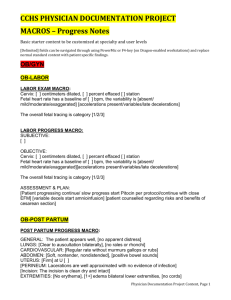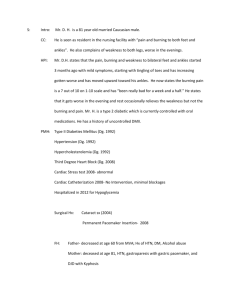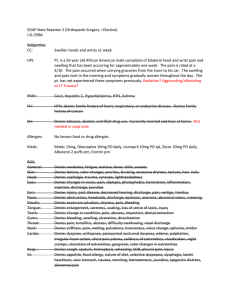N703 Chronic SOAP Note
advertisement
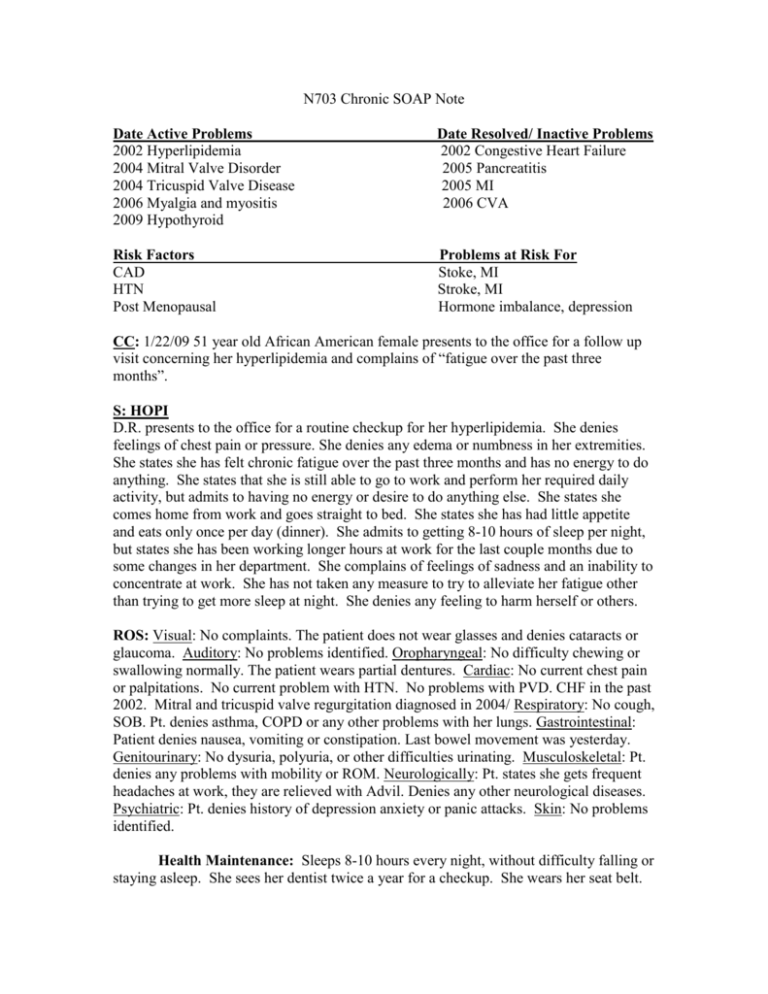
N703 Chronic SOAP Note Date Active Problems 2002 Hyperlipidemia 2004 Mitral Valve Disorder 2004 Tricuspid Valve Disease 2006 Myalgia and myositis 2009 Hypothyroid Date Resolved/ Inactive Problems 2002 Congestive Heart Failure 2005 Pancreatitis 2005 MI 2006 CVA Risk Factors CAD HTN Post Menopausal Problems at Risk For Stoke, MI Stroke, MI Hormone imbalance, depression CC: 1/22/09 51 year old African American female presents to the office for a follow up visit concerning her hyperlipidemia and complains of “fatigue over the past three months”. S: HOPI D.R. presents to the office for a routine checkup for her hyperlipidemia. She denies feelings of chest pain or pressure. She denies any edema or numbness in her extremities. She states she has felt chronic fatigue over the past three months and has no energy to do anything. She states that she is still able to go to work and perform her required daily activity, but admits to having no energy or desire to do anything else. She states she comes home from work and goes straight to bed. She states she has had little appetite and eats only once per day (dinner). She admits to getting 8-10 hours of sleep per night, but states she has been working longer hours at work for the last couple months due to some changes in her department. She complains of feelings of sadness and an inability to concentrate at work. She has not taken any measure to try to alleviate her fatigue other than trying to get more sleep at night. She denies any feeling to harm herself or others. ROS: Visual: No complaints. The patient does not wear glasses and denies cataracts or glaucoma. Auditory: No problems identified. Oropharyngeal: No difficulty chewing or swallowing normally. The patient wears partial dentures. Cardiac: No current chest pain or palpitations. No current problem with HTN. No problems with PVD. CHF in the past 2002. Mitral and tricuspid valve regurgitation diagnosed in 2004/ Respiratory: No cough, SOB. Pt. denies asthma, COPD or any other problems with her lungs. Gastrointestinal: Patient denies nausea, vomiting or constipation. Last bowel movement was yesterday. Genitourinary: No dysuria, polyuria, or other difficulties urinating. Musculoskeletal: Pt. denies any problems with mobility or ROM. Neurologically: Pt. states she gets frequent headaches at work, they are relieved with Advil. Denies any other neurological diseases. Psychiatric: Pt. denies history of depression anxiety or panic attacks. Skin: No problems identified. Health Maintenance: Sleeps 8-10 hours every night, without difficulty falling or staying asleep. She sees her dentist twice a year for a checkup. She wears her seat belt. LMP: postmenopausal X 21/2 years, last pap 3 years ago. Colonoscopy 2008. Denies fever, chills or night sweats. Family History: Mother: HTN (alive) Father: HTN (alive) Maternal Grandmother: Ischemic heart disease (deceased) Maternal grandfather: HTN (deceased) Paternal grandmother: DM type II (deceased) Paternal Grandfather: CAD, MI at age 52 (deceased) No family history of mental illness Personal/Social Profile: Patient denies ever having used tobacco or alcohol. She lives alone and has never been married. She has no children. Her only living relative is an older brother who lives in Arizona. She states she only sees him once a year during Christmas. She denies using any illegal drugs. She drinks 3 cups of coffee every morning. She denies any other caffeine including chocolate. She reports she drinks very little milk but states that she takes 2 calcium chews per day. Medications: Cholest off 450 mg daily Zetia 10 mg daily Synthroid 25 mcg daily Ground flax seed 2 tablespoons daily Fioricet 325 mg one tablet every 6 hours as needed for headache Claritin 10 mg daily as needed for allergy symptoms Almonds 1 ounce daily Allergies: Macrodantin – emesis NSAIDS/ ASA – GI Bleed Food allergies: oranges – hives Chocolate – anaphylaxis O: Vitals: BP = 110/80, Pulse = 80, respirations = 18, Temp = 98.5 F, Ht 157.5 cm (5feet 2 inches), Wt. 50.44 kg (111 lbs 3.2 oz), BMI 20.34 General: African American female who appears her age, in no acute distress. Appears to have a flat affect. Skin: Light brown, warm and dry. No lesions, rashes or ulcers. Skin turgor good Hair: texture is course, shoulder length black hair. Equal distribution with no areas of hair loss Chest: Symmetric expansions, no rales/ rhonchi/ wheezes noted. Respirations equal and clear throughout all lung fields Heart: RRR, S1 and S2 audible, No gallops or rubs, PMI @ 5th ICS @ midclavicular line, no edema noted, peripheral pulses present Abdomen: Soft, non-tender, non-distended. Liver and spleen non palpable. Ears: TM pearly gray, bony landmarks visible, no bulging or drainage noted bilaterally. Eyes: PERRLA, no erythema or visible discharge noted bilaterally Nose: No erythema or edema noted. No nasal discharge. Septum intact. Throat: No visible exudates, no petechiae. Mucus membranes moist and pink. Teeth intact Neck: No lymphadenopathy noted. Thyroid non-palpable Neuro: CN II – XII intact, sensory intact, strength equal bilaterally, no tremors or nystagmus noted. Psych: Alert and oriented X3. Recent and remote memory intact. Romberg: no drift. Gait strong and steady. Flat affect. Pt. appears quiet and distant Labs: TC – 269 TG – 62 HDL – 75 LDL – 182 ALT/ AST – 21 GLU – 97 TSH – 3.8 GFR – 94.5 Creatinine – 0.82 Potassium – 4.1 A: 1.) Hyperlipidemia 2.) Depression 3.) Health maintenance: Mammogram due 2009 P: 1.) Recommended LDL goal of < 100 due to her past TIA and post menopausal state. LDL has increased 11 points from last visit 3 months ago and remains moderately elevated. Start Welchol 625 mg three tablets twice daily with meals and a full glass of water. Take this medication at least 1-2 hours apart from your other medications. Blood pressure is well controlled. This patient is advised to exercise 30 minutes at least three times per week and follow a low saturated, low Trans fat diet. 2.) Start Zoloft 50 mg daily. Take ½ tablet for the first four days and then increase to one tablet daily. Take in evening as drowsiness may occur. Find a co worker or a friend that you can talk to and try to identify and eliminate stressors in life. Pt. is also recommended to seek out counseling. Patient’s employer offers free and confidential counseling services to employees. This patient is encouraged to call and set up an appointment. This patient is also encouraged to set up a daily routine and a set bedtime as this may help to eliminate extra feelings of fatigue. Patient is instructed to have her TSH level rechecked in 6 months. 3.) Schedule mammogram in two weeks. Patient educations regarding calcium intake and eating three meals per day with small snacks or six small meals per day. 4.) Follow up in 3 months. Patient instructed to return sooner if new symptoms develop.
